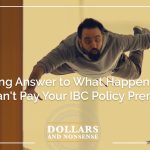In this episode, we discuss why it’s essential to stop going through the motions with your money. Step number one: determine what you’re genuinely passionate about in your financial life and then make decisions that drive you towards your goal. This is the one thing with money you must do.
Many of us are making decisions, not necessarily based on what we’re passionate about or what we define as success. Instead, we’re making decisions about what the world tells us to plan for or to believe in even when it’s not what we want.
We’ve never met somebody passionate about their retirement income. Usually, those people are looking forward to what they’re going to do in retirement. Perhaps, those people never stopped and asked the big “Why’s.” It all starts with one thing with money everyone should do.
Your One Thing With Money Topics Discussed:
- Starting with why
- Defining financial success
- Rethinking retirement
- The 10 Commandments of Wealth
- All the questions you must ask
Episode Takeaways:
- I want to leave the world better than I found it, but I want to have left a legacy of giving, more than anything, of truly being a blessing to the people that I love and value.
- You can have a passionate retirement. But most of us, is our passion really to never be a worth or value to society?
- We’ve got to start being making conscious decisions to get where we want to be and stop merely going through the motions. You spent your whole life earning it, after all.
Episode Resources:
- What is Infinite Banking?
- Episodes with Rabbi Daniel Lapin
Podcast transcript for episode 75: Do This One Thing With Money
Nate: In this episode we will discuss why it’s important to stop going through the motions with your money. Everyone needs to define what they’re truly passionate about in their financial life and then make decisions that drive you towards your goal. If you define what success is, you can attain it. She’s Holly and she helps people find financial freedom.
Holly: He’s Nate, and he makes sense out of money. This is Dollars and Nonsense. If you follow the herd, you will be slaughtered.
Many of us are making decisions, not necessarily based on what we’re passionate about or what we want to leave or what we define as success. But we’re making our decisions about, especially in the future and financially, is what the world tells us to plan for or to believe in. And yet we’re really not passionate about that. I don’t know if I’ve ever met somebody that’s really passionate about retirement and their retirement income, but maybe it’s what they’re going to do afterwards that they’re passionate about, but they’ve never stopped and asked the Why. Why am I doing this? Why am I saving? What am I passionate about?
And I know I told Nate, at the end of my life. I really, truly hope my family’s provided for, but I hope more than anything else that I’ve given them the resources and the tools to go out and pursue what they want to do, to have foundation that gives back to what ever interest we determine is a good interest or what we want to pour into.
I want to leave the world better than I found it, but I want to have left a legacy of giving, more than anything, of truly being a blessing to the people that I love and value, but also organizations and charities we believe in, so that even in death we still give.
Nate: You’re exactly right. And you know, Simon Sinek wrote a book, Start with Why. Most people in their financial life do not start with Why. They don’t know why they’re doing what they’re doing. Or at least they haven’t made a conscious decision to follow what they’re passionate about.
So as we’ve talked about, many people are just going through the motions. If the world says I should fund my 401k when I get my job, because that’s what a smart adult would do, then I’m going to do it. Or you know, if everyone says I should really focus on retiring at age 65, that’s what I’m going to do. We don’t actually even think if that’s what we want in our life. We haven’t started with why. We don’t even know what we’re passionate about. We haven’t thought what does success really look like for me? And so I’ve talked to some people who when you get down to it, they’ve been saving for retirement. They’re using retirement programs and doing all these things.
But in reality they’ll say, “I don’t actually think I’m going to retire. You know, at 65 I’m going to keep working. I’m going to do something of value. I don’t want to just retire. My main focus, I want to leave a legacy. Kind of like what Holly was talking about. That’s my real desire, is to change the outlook of my family forever. I grew up poor and I’ve got a good job. Now I’m doing some things. I don’t want to my kid… And my parents dies, they didn’t leave me anything. I don’t want that to be our family’s destiny forever. That’s what I’m truly passionate about.” But then when you look at what they’re doing, they’re doing what the world’s doing, which is saving and retirement programs, they’re doing things that is more what the world would call a focus for retirement.
If your goal is retirement, that’s fine, but if it’s leaving a legacy, then maybe retirement is actually going to hurt your ability to do that, because retirement means when I get to a certain age, I’m going to stop working, I’m going to stop producing value. I’m just going to live off the wealth that I’ve created. I’m going to start liquidating it. I’m gonna start eating it up for my lifestyle.
And if that’s your passion, that’s fine. I mean, we’ll talk about that in a moment, but what I am trying to say is that mentality, if you’re just doing that as a cookie cutter approach, you might miss out on real success. Like you might be empty at that point. You might feel empty. You might not be satisfied, because everything you did, every decision you made was based on someone else’s dream of the future. Whereas yours could have been very different. You just never took the time to figure out what success was going to be, with why you’re saving money in the first place.
Holly: Or you go into it with the retirement mindset, “I am going to retire because that’s what everybody told me to do.” That you need to retire at this age or you only live to this. I find so many clients, that they’re working so hard, Nate, to have just the little bit more than what their parents had to hopefully give their kids something, and retirement is not their goal. It really isn’t, but it’s what the world has told them retirement should be: That I need to plan and have a nest egg because I’m going to have to retire someday, and that’s the money I’m going to have to live out. Or the mentality of the retirement means I’m not a burden to my family.
I think it’s very true what you said, you can have a passionate retirement. But most of us, is our passion really to never be a worth or value to society? Once you stop working, what are you doing? And I loved a few episodes back when you said maybe it shouldn’t even be in our vocabulary or mindset. But also you’ve got to have a bigger passion in retirement. You can have retirement as a passion, but I think you obviously have to have something bigger than just retirement.
Nate: You know, we’ve had Rabbi Daniel Lapin on our podcast, and we’re fond of him and his insight into money and business. He talks about one of the 10 commandments for making money and being wealthy is to get the idea of retirement out of your head. It’s helped me a lot too. I think it’s helped other people. I think that the retirement mindset itself was something that was conjured up by socialists, we can go back to that issue and by the money managers of the world, Wall Street, trying to convince us to funnel money to them. So they’ve got a business, so they’re painting this beautiful picture of golden years in the future where you finally don’t have to work, and they’re trying to convince you it’s a great idea. Some people love it. Studies say you die earlier when you retire early. I mean it’s like you don’t feel satisfied, and that’s because we were made to continue to produce value. So I guess what we’re trying to get at is if you would start with your Why, the real Why of earning money… If the real Why for you of doing the thing you’re doing is just so that one day you can retire, okay that’s good, but at least you’ve defined it. Now you can make decisions that produce the best results for that timeframe.
But if your real Why is something different? Maybe if you want to give more than you ever thought you could. Maybe it’s you want to leave a legacy. Maybe you’re working because you enjoy it, which I would encourage everyone to try to find something they can enjoy doing. If that’s the reason you’re doing it, because you love creating value, then maybe the wealth building purpose you have is going to be different than what the cookie cutter 401k IRA mentality provides. Maybe it’s going to look different because your goal is not those things. I think that retirement, the idea can affect you while you’re working and afterwards, or it can actually hurt you, if especially if you don’t actually want to. So we’ve got to define your Why. Why are you working? Why are you saving? What vision do you want to achieve in the future? What is it that you’re going for?
Holly: What is your dream? In this golden age, what do I want to be doing? But what is your dream? What is your vision? What is your legacy you want to leave? The Why goes with it. Why is that your legacy or your dream? Ray says if he’s having a client signing an application on the day he dies or he’s in the hospital, he’d be a happy camper, because he died helping somebody. He was still a value, and it’s this generational wealth that you want to pass on or knowledge that you want to pass on. And I think for so many of us, we’ve grown up in the mentality of what everybody told us to do. Like Nate said with Wall Street and this and that: Who knows your future better than you, and your passion and your dreams?
We got to define those things, too. Maybe they don’t know what your real dream and passion is, and it doesn’t have to look like the world’s. So I guess that’s what we’re sincerely trying to encourage, is your decisions today are mainly based on what we now… You can change those decisions to reach a different goal. So if your decisions are, I’m just working until age 65 so I can retire and I’m going to consume my money, then we’ll make decisions that way. If your decisions are, I want to produce as much value as I can to my family, to the world to leave a legacy, and I want to be a giver, and I want to do things to create value for as long as possible. If that’s your desire, then I don’t think the norm of the cookie cutter approach of the mutual fund and Wall Street world is really going to fit your life.
Announcer: Have you ever wondered how to stop worrying and just make and keep more of your money? We believe in challenging the status quo. We believe in defying conventional wealth tools while maintaining traditional values. After all, most of those conventional tools only ever seem to make someone else on the inner circle rich. You can become debt free, in control, secure, and achieve financial significance. Private family financing can be used in your life and even your business.
Let us help set you free from worry. Visit livingwealth.com/freedom to receive your free copy of The Tree of Wealth. You’ll learn about the tools banks themselves use and rarely speak about openly. These are the strategies used to launch Disney, JC Penny’s, and countless successful families. For more than 46 years, Living Wealth has focused on treating clients with respect and honesty, while helping them achieve financial freedom. Learn how to turn your hard work into significance. Visit livingwealth.com/freedom to instantly receive your free copy of The Tree of Wealth. You’ll be enabled to have cash today and in the future. It’s more than mere infinite banking. It’s private family financing. Don’t let banks and Wall Street dictate your financial future. Go to livingwealth.com/freedom to instantly receive your free copy of The Tree of Wealth. Now back to Nate and Holly.
Holly: You have to start asking yourself, what am I going to implement to provide for that future, to achieve that dream, that goal. And I think for so long we haven’t even asked how am I going to do that? What am I going to do? But you got to start thinking outside the box. You cannot just say this CD, this mutual fund, this IRA, this 401k is going to provide for me. You’ve got to actually say, what am I going to do differently, and how do I paint that picture, and what are the resources I use-
Nate: Yeah.
Holly: … to do that?
Nate: We’ve got to start being making conscious decisions. We can’t, you know, our slogan here is if you follow the herd, you will get slaughtered. And that that’s true. If you don’t make conscious decisions, you’re setting yourself up for some sort of unsatisfactory ending that was created for you by society, that you didn’t have an input in to plan or to even know what you wanted. So if you can come down with your Why, Why is it that I’m doing what I’m doing? And then if you find out that your Why, the real reason you’re doing things, is not being shown up in your life and where you’re working, and in your dreams and your visions, then you have to make some changes consciously.
And then you’ll feel so happy whenever you’ve achieved it, because you were like, I was a part of this. I didn’t just fund the 401k because that’s what they said. And maybe the 401k is great for you, but maybe it’s not. It just depends on your real Why. So my suggestion is to not have a passion for retirement alone. I think that the world’s trying to convince us that we should be passionate about saving money for retirement, I think that we should try to find a bigger passion, something that’s beyond just me, where the whole goal is not to consume my resources whenever I’m 70. I think that the goal should be to build generational wealth, and I think that if you are wealthy, you could retire if you wanted to. Like the goal shouldn’t be just retirement, it should be to build wealth, sustainable foundational wealth that can last generations. Then we can make a decision at that time. But our main goal wasn’t just retirement. It was above that. It was beyond that.
That’s not the goal of working. The goal of working is to earn money, to produce value, to get paid to do so, to build wealth. You know, in God’s word, it says that a wise man leaves an inheritance for his children’s children. That’s two generations. They’re trying to say building wealth is actually a sign of stewardship, and God can bless that. But you can’t just be making money for you to retire. I think that that limits you, that it should be bigger than that. Not meaning to judge anyone. I’m not trying to, I’m just saying that that’s my suggestion is to get retirement out, building wealth in, and I bet you you can retire if you’re wealthy, but you won’t have to. And that wasn’t your vision from day one.
Holly: If you’re not passionate about what you’re doing, find something that you are passionate about. But we’ve got to get out of the me mentality. Retirement is all about you. And most people, even when they retire, only hope that they outlive their money, right? That their money doesn’t outlive them. They don’t want to run out of money. That’s a big, huge thing. And what we’re saying is you can have retirement, but you can also have to have a bigger picture, or else you’re not going to be satisfied, in my opinion. And you might die early, and you might leave a little bit of money to your family, but what was the greater good of the retirement? What truly do you want to do outside of that? And I think there’s so many opportunities to think outside the box.
I know for me, if I had not joined a family business that I truly am passionate about, I love what I do and I love helping people, I think I would have been stuck in the same mentality as everybody else. And I was going down that road, don’t get me wrong. I was like, okay, I didn’t do a 401k because I had a mentor and a father who told me it was bad. Right? But if I didn’t have that, I would’ve been in the same boat everybody else was. Because I didn’t bother to ask the questions of what do I want, what do I want to leave? And why do I want to leave it?
Nate: It’s okay to retire from a job. But I don’t think the idea of retirement, of not working anymore, should be such a huge focus. Like if you have a job and you retire at 65, that’s okay. But I don’t know if it’s wise to have a goal of retiring at 65 and say, “I’m not going to work at all for the next 30 years and I’m going to die at 90, 95 having lived 30 years just consuming the resources I’ve built up while I was working.”.
I think it’s okay if you want to try something new, if you want to venture out, but I think that you should be thinking about those things, not just, you know, “Next year I’m playing retire and I’ve got no idea what I’m going to do.” It’s fine to retire from a job.
But that’s what Rabbi Lapin talks about. I think that at age 65 your wisdom, your experience is worth something. You should create some way to produce value to somebody that they’re willing to pay you for your service. That’s fulfilling, that’s the way God intended the world to work. And the idea of just quitting, I think it’s going to be unfulfilling to some. It might feel great to no longer have to punch a time clock, you know, and not come into the office because you’re just stressed out. But that’s going to wear off. Five, 10 years later the excitement is gone. And I bet you would have wished that you had started something new.
You start something that you enjoy, you start something, you can help people and get paid to do it. It can be fun. I mean if you’ve worked as a W-2 employee for your whole life, you don’t know the excitement it is to start something, you know, to think entrepreneurially, to do something that’s your own. That’s exciting. So I encourage you to consider your financial life is not ending at 65 and then transitioning. But transition to something new if you want, but have your wealth really defined what your Why is for working, for saving money, and then make decisions that empower that vision.
Holly: And I think if you change the mindset from a retirement income and you create a bigger passion for yourself, you’re actually going to create passive and resident residual income now and for the future. But if you don’t start asking those questions now, then you’re going to get to the age of retirement and only have retirement there for you. And we don’t want you to get there. We want you to start asking it now so that by the time you get to that age where you feel like, “Hey, maybe I do want to retire,” or, “I just don’t want to do this job anymore,” you have avenues you can proceed and go down.
I know Nate said five, 10 years down the road, it’s going to get old. I happen to know somebody that 35 years punching a time clock, doing day in, day out, retired July 1st. Well, we’re not at July 15th and they’re bored already. I’m just gonna say they’re bored. Right? And they’re roughly two weeks in. Because that’s all they knew how to do, “Now, what do I do with my time?” And the only thing this person has is his 401k.
Nate: And that’s what we brought up a few episodes back was, you know, if there’s one thing you can do to get the worries of, “Will I have enough to retire?” or, “Will my money last as long as I do?” If you want to get rid of those worries than just get retirement out of your head. Now, “I’m going to produce value in some way. I’m of worth to somebody here on this earth, and they are willing to pay me for the value I can produce, and I’m just going to do that for as long as I can and it’s going to be fun. And that’s what I want to do.”
And you know, read some of Rabbi Daniel Lapin’s books that he can really help you get out of that. But start with Why. Don’t just go through the motions. Consciously make a decision: This is success to me. And that can change over time, but at least you know right now, “When I’m 90, this is what I wanted to achieve with my money. This is my main thing with it on my deathbed,” and then make decisions that empower that Why.
This has been Dollars and Nonsense. If you follow the herd, you will be slaughtered.
Holly: For free transcripts and resources, please visit livingwealth.com/e75









